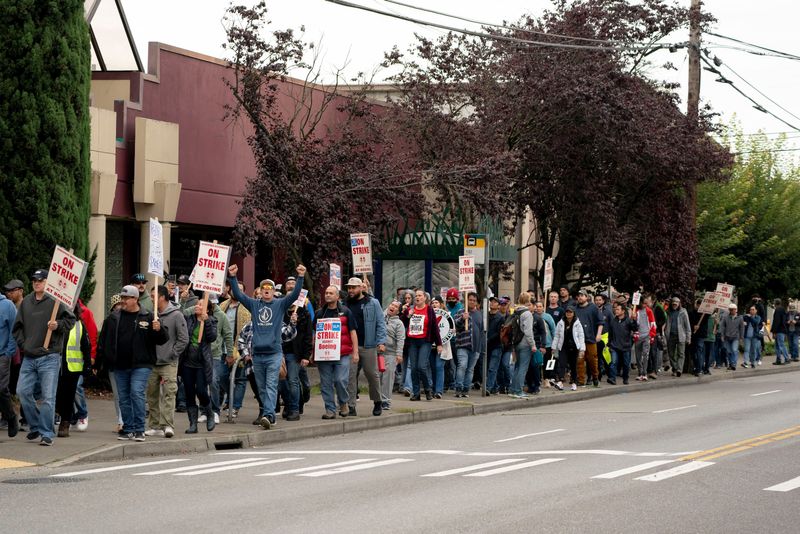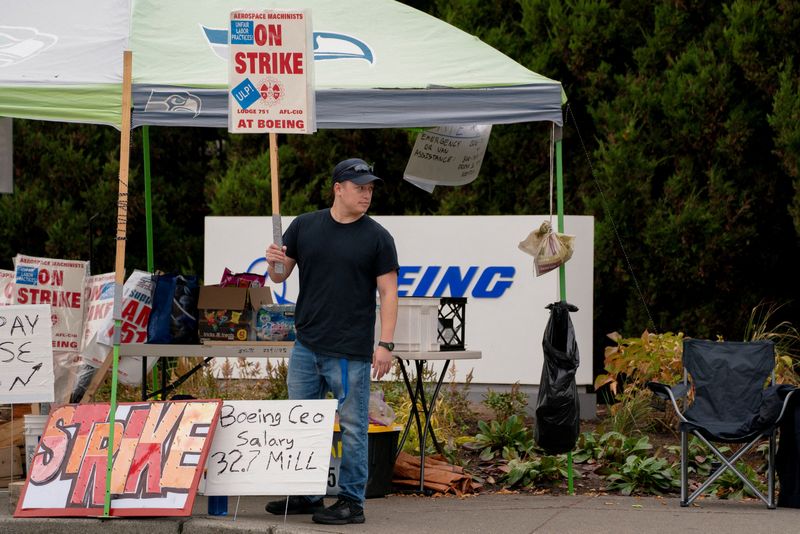By Joe Brock and Matt McKnight
SEATTLE (Reuters) -Boeing factory workers held a large rally in Seattle on Tuesday to demand a better wage deal, mounting pressure on new CEO Kelly Ortberg to end a bitter strike that has plunged the planemaker further into financial crisis.
Hundreds of striking workers packed the main hall at their union's headquarters chanting "Pension! Pension! Pension!" and "One day longer, one day stronger!"
Outside, factory workers told Reuters that the recent 17,000 job cuts announced by the company would not deter them from continuing to fight for higher wages and an improved pensions.
Top Washington state Congressional Democrats added pressure on Boeing (NYSE:BA), calling on both sides to reach a mutually beneficial deal "providing workers with the wages and benefits that acknowledge the essential and irreplaceable work they perform for the company."
U.S. Senator Maria Cantwell on X published the letter to union and company leaders by her, Senator Patty Murray and Representatives Adam Smith and Rick Larsen.
Around 33,000 of Boeing's unionized West Coast workers, most in Washington state, have been on strike since Sept. 13, demanding a 40% wage increase spread over four years and halting production of the planemaker's best-selling 737 MAX and its 767 and 777 widebodies.
"We want Boeing management to know that we're strong and united, and their scare tactics aren't going to work," said Matthew Wright, a 52-year-old electrician who works on the 767 jet. "We're not afraid of them."
The show of force comes as Boeing moves to give itself financial breathing space on Wall Street. It announced a window for up to $25 billion in stock and debt offerings over the next three years on Tuesday, as well as a $10 billion credit agreement. Boeing shares closed up 2.3% on Tuesday.
The International Association of Machinists and Aerospace Workers and Boeing leadership are locked in a paralyzing blame game over the strike, with both sides filing charges accusing the other of unfair labor practices during negotiations.
Boeing last week withdrew its latest offer, which included a 30% wage increase over four years, after talks also attended by federal mediators broke down.
Acting U.S. Labor Secretary Julie Su met with Boeing and the IAM in Seattle on Monday in a bid to break the deadlock, her first in-person intervention.
U.S. Representative Pramila Jayapal, whose district includes downtown Seattle, addressed the cheering crowd on Tuesday, criticizing Boeing and calling on Ortberg to end the strike.
"He has an opportunity to turn this around and to actually give you the contract that you deserve, so that we can get back to building quality planes, so that you can get back to doing your jobs, so that the United States of America can continue to have the most sophisticated, quality company in the Boeing company that it has ever had," she said.
"Let's make Seattle Boeing town again!"
'NO PENSION, NO WRENCHING'
IAM members have been holding smaller picket lines in front of Boeing sites throughout the strike. In Seattle - where Boeing is among the top employers along with Microsoft (NASDAQ:MSFT) and Amazon (NASDAQ:AMZN) - striking workers on Tuesday carried placards that said "No Pension, No Wrenching" and "Kelly Ortberg, Pay it Forward".
Local IAM leader Jon Holden, who is leading wage talks for the union, called on Ortberg to join negotiations in person.
"As the pressure mounts, as losses grow, it's time he brought himself to the table do the hard work,” Holden said in the final speech at the rally on Tuesday afternoon.
In mid-November, Boeing will send out 60-day notices to employees being laid off. A second phase is planned in December if needed, industry sources said.
Boeing will refrain from asking for voluntary departures to limit severance cash and avoid an exodus of skills, sources said.
A Boeing spokesperson said on Monday the planned job cuts included both union and non-union workers, but striking IAM employees were not currently affected. Some staff in Boeing's loss-making defense unit are also expected to be among those cut.

Investors and regulators have had Boeing under the microscope since a door panel flew off a near-new 737 MAX jet in midair in January.
Since then, the planemaker's shares have dropped more than 40%.
